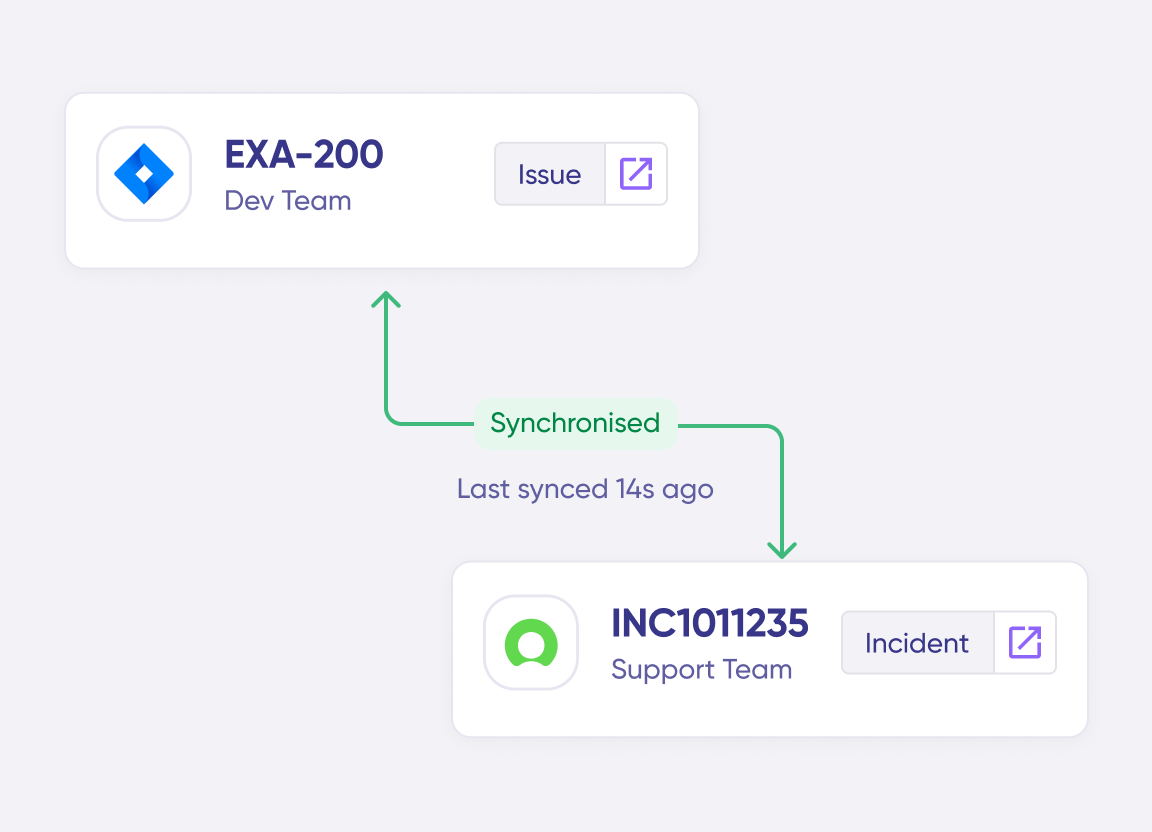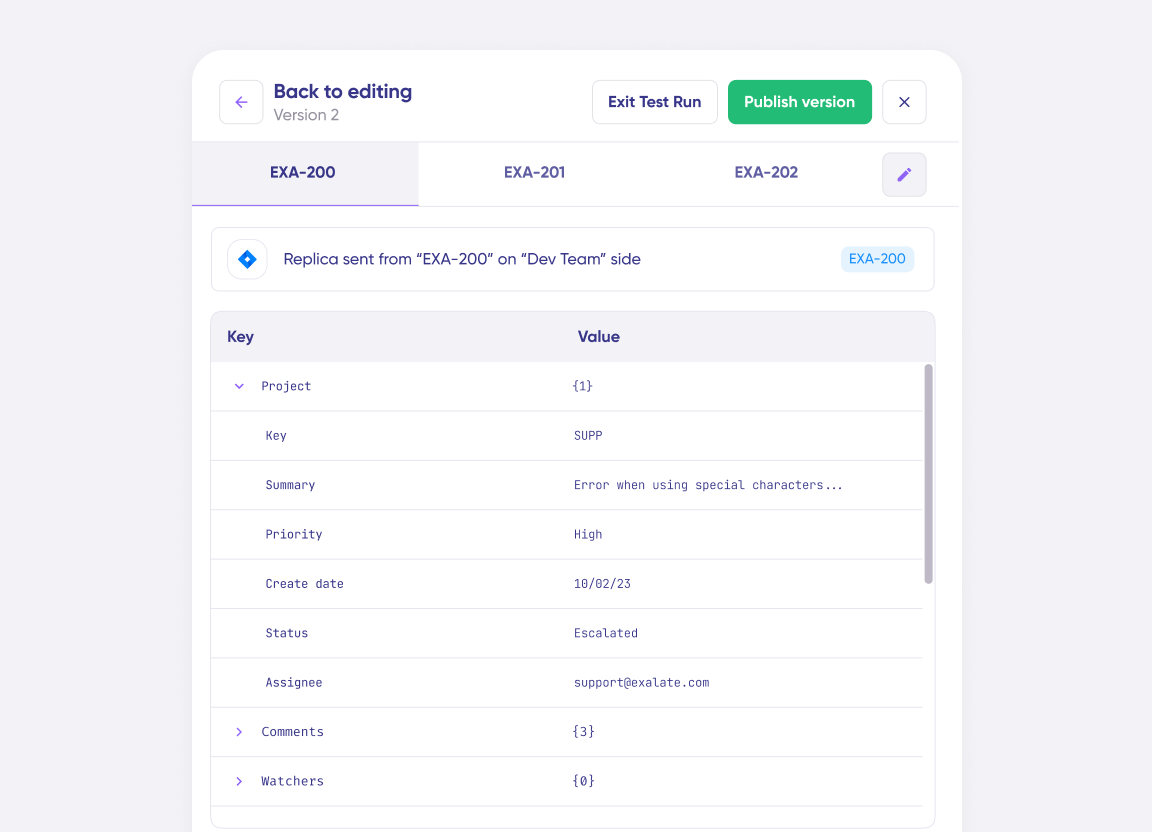Jira to Jira Integration
Set up a one-way or two-way Jira to Jira integration. Sync Jira issues, and sprints between multiple Jira instances.
Experience Jira Service Management integration with other Jira instances and get real-time status updates. Break down team silos and move data around however you like.
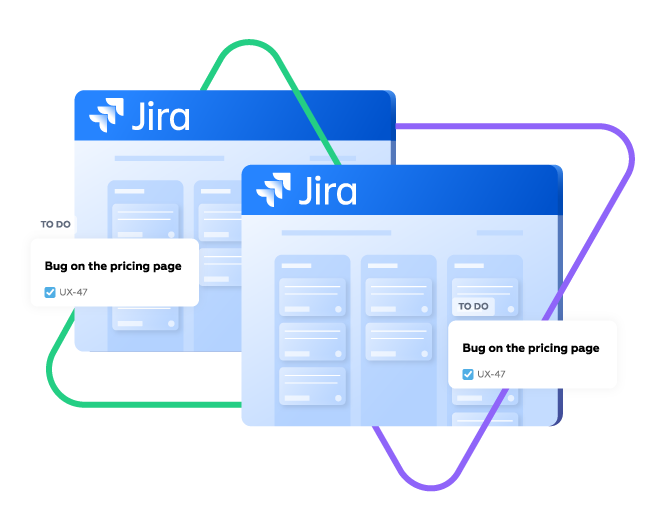
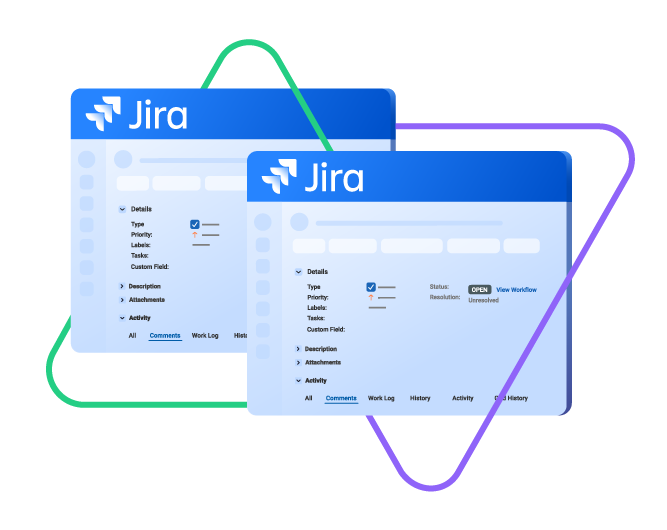
sync issue types, labels, priority, status...
sync any custom fields, attachments...
sync comments, worklogs, history...
sync issue types, labels, priority, status...
sync any custom fields, attachments...
sync comments, worklogs, history...
3.5/4
Highest Rated Integration App on the Atlassian Marketplace






Jira Sync: Real-time, Secure Data Flow
Keep your development, support, or operations teams aligned with instant status updates. With the right Jira sync, you will have secure collaborations across multiple systems, no matter where your teams are located.
Increase productivity with real-time Jira issue sync. Eliminate delays and ensure everyone has access to the latest info.
Empower teams to work more efficiently and focus on what they do the best.
Ensure accurate information flows securely between multiple Jira instances.
Tailor the integration to match your specific needs, from issue types to custom fields, ensure a smooth fit into your processes.
Make informed decisions with access to consolidated data.
Convert customer tickets in Jira service management into actionable Jira issues with ease.
Connect Multiple Jira instances, Anyway You Want
Sync standard and custom Jira fields your way – within the same instance or across multiple ones. Easily map fields in your sync rules to match your workflows

Jira Service Management
Tickets
+40 fields are supported, including:
- Custom fields
- Summary
- Status
- Description
- Key
- Comment
- Attachment
- Priority
- Reporter
- Third-party plugin fields (e.g Insights)

Jira
Jira Software (Cloud and Data Center)
Jira Service Management
Work Items (Issues)
(Bugs, Tasks, Stories…)
+40 fields are supported, including:
- Custom fields
- Summary
- Status
- Description
- Key
- Comment
- Attachment
- Priority
- Third-party plugin fields (e.g Insights)
Sprints
All fields are supported, incuding:
- Name
- State
- Start date
- End date
- Complete goal
- Origin board ID
- Goal
+10
Years of experience in integrations
+4,000
Active Installs on Jira only
3.4/4
Highest Rating on the Marketplace
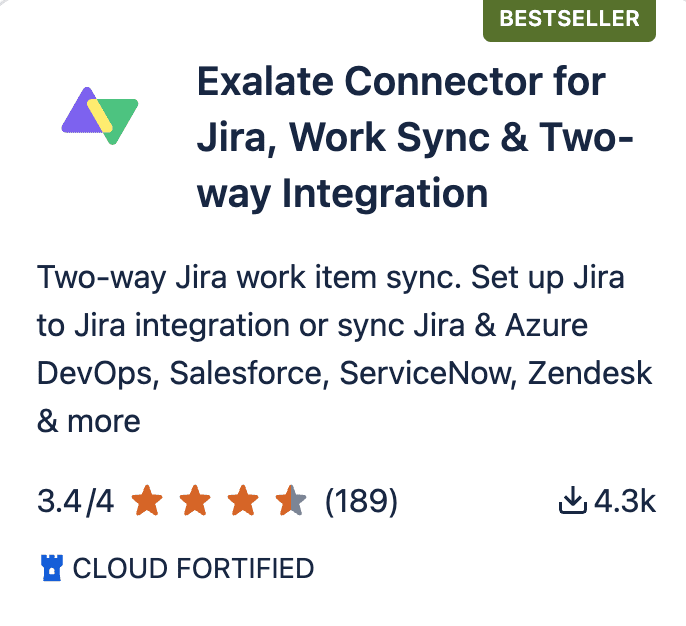
Get the Most Out of Your Integration
Connect multiple projects, instances, and platforms. Use different rules for each connection.
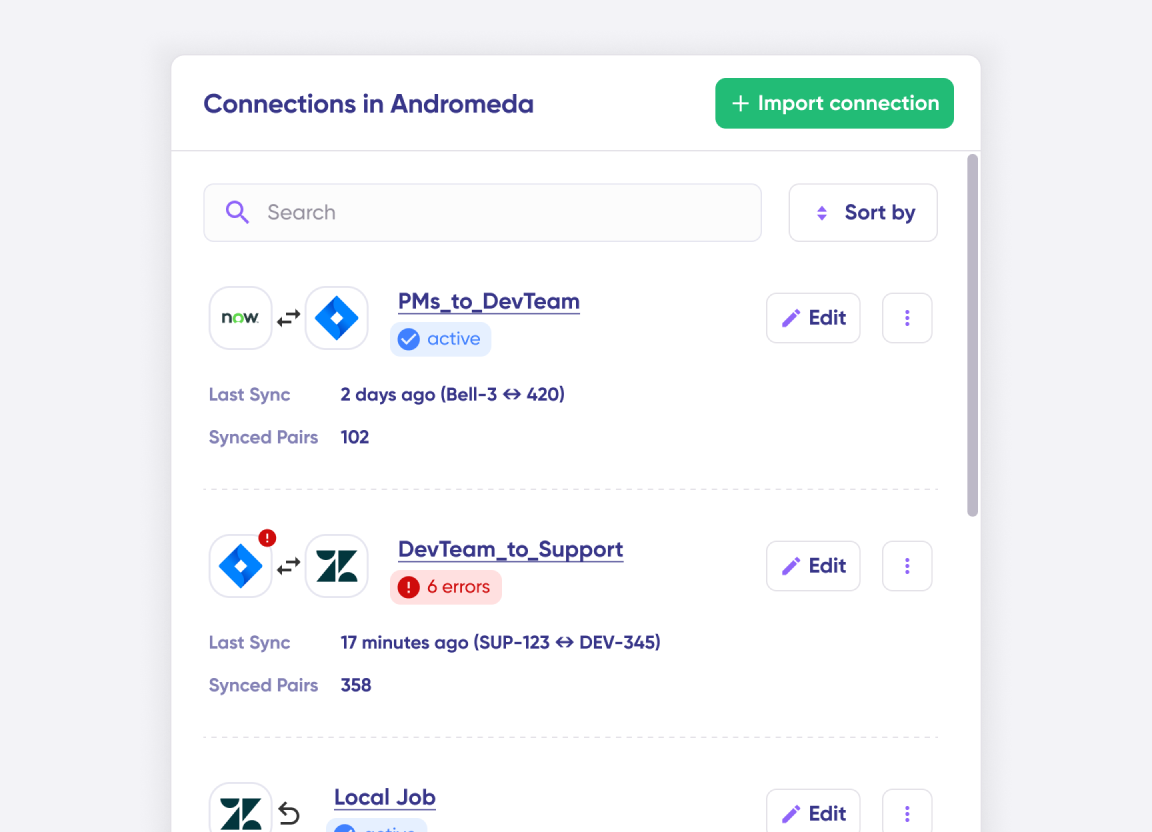
Get AI-powered recommendations for resolving the issue, including possible fixes and next steps.
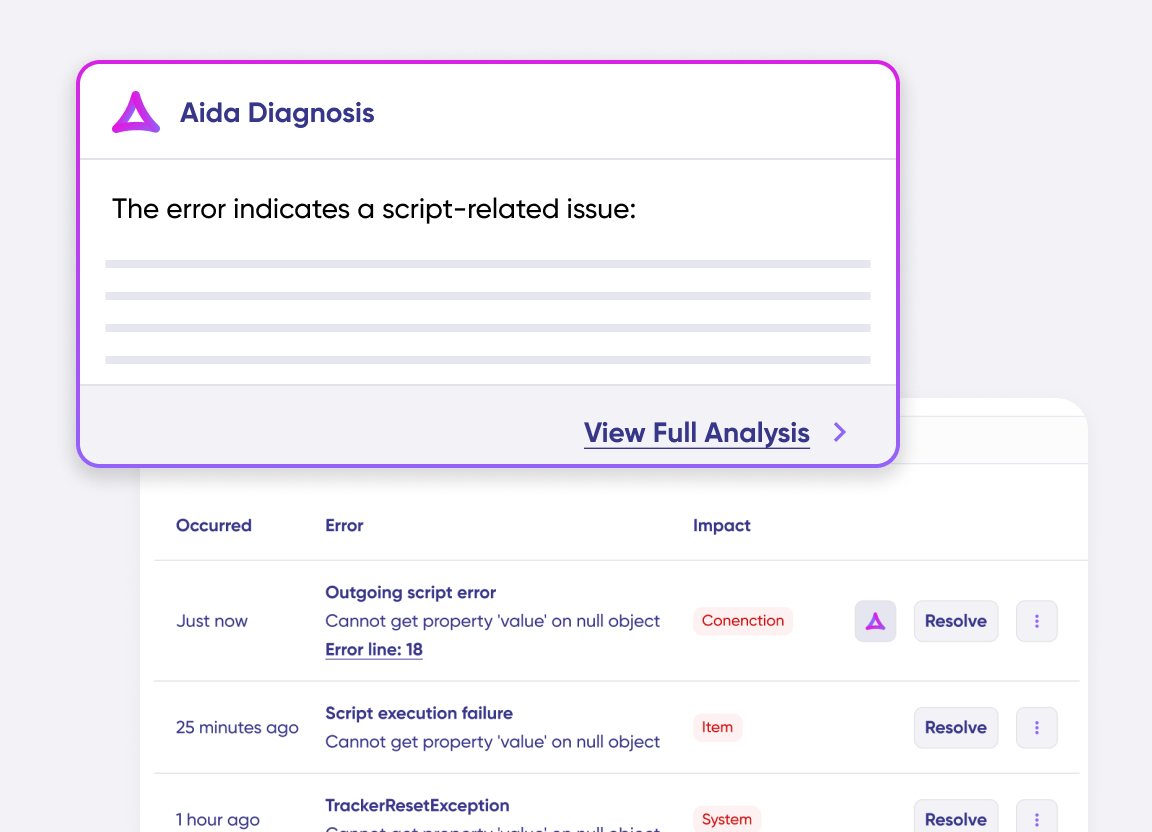
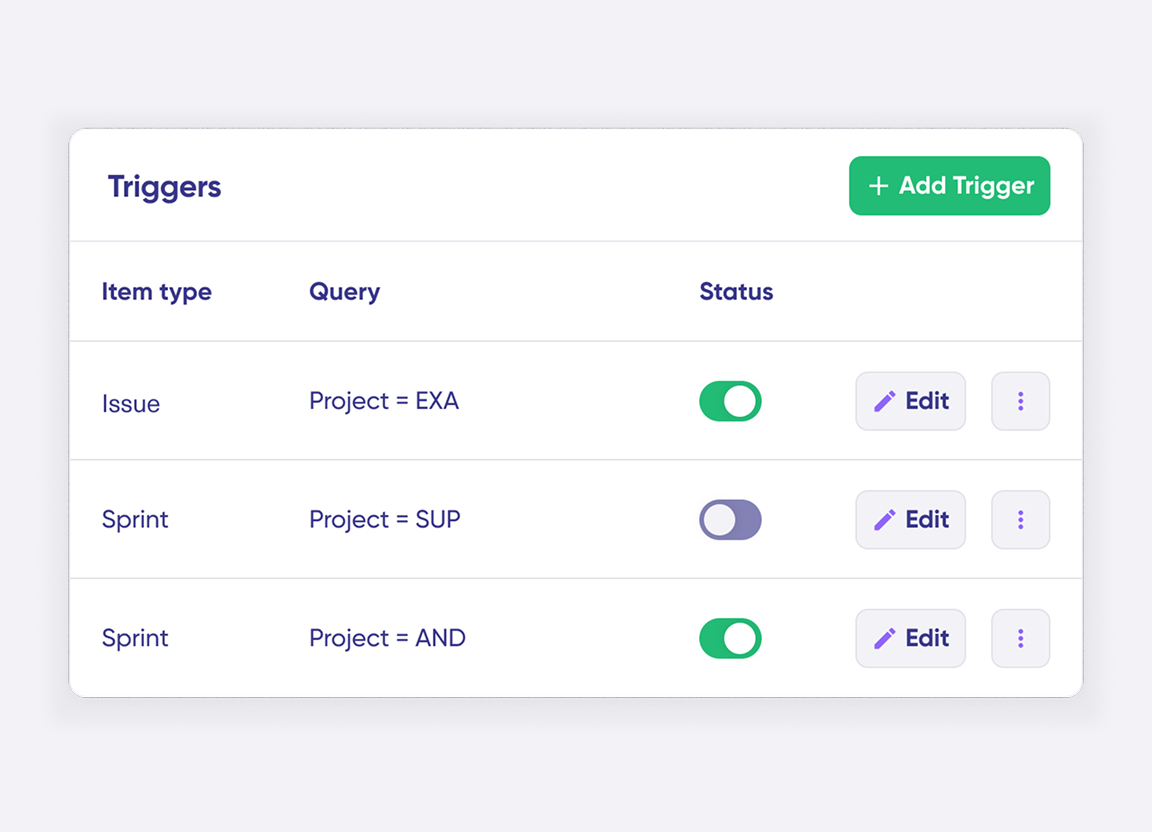
Decentralized Integration
Retain independent control of your integration, even in cross-company scenarios. Don’t worry about how adjustments made on one side will impact your existing configuration. There's no requirement to share credentials or administrative privileges, eliminating the risk of exposing sensitive data.
Sustainable Scalability
Begin with pre-configured connections for simple sync needs, then expand and accelerate your growth by employing custom script-based connections. Connect with your integration partners to foster better relationships.
Top-notch Security
Protect your sensitive data from unauthorized access with our single-tenant architecture. Stay ahead of any data breach or suspicious activity using advanced endpoint detection and response (EDR).
How it Works
Connect
Easily connect multiple projects, instances, and platforms. With local, or external partners.
Customize
Set your sync rules to make sure the right data is shared.
Prompt Exalate’s AI to generate rules, or fine-tune with Groovy-based custom mappings and logic for complete control.
Automate
Set triggers to automate your sync based on specific conditions.
Synchronize
Now your connected instances will exchange information automatically. Happy syncing!
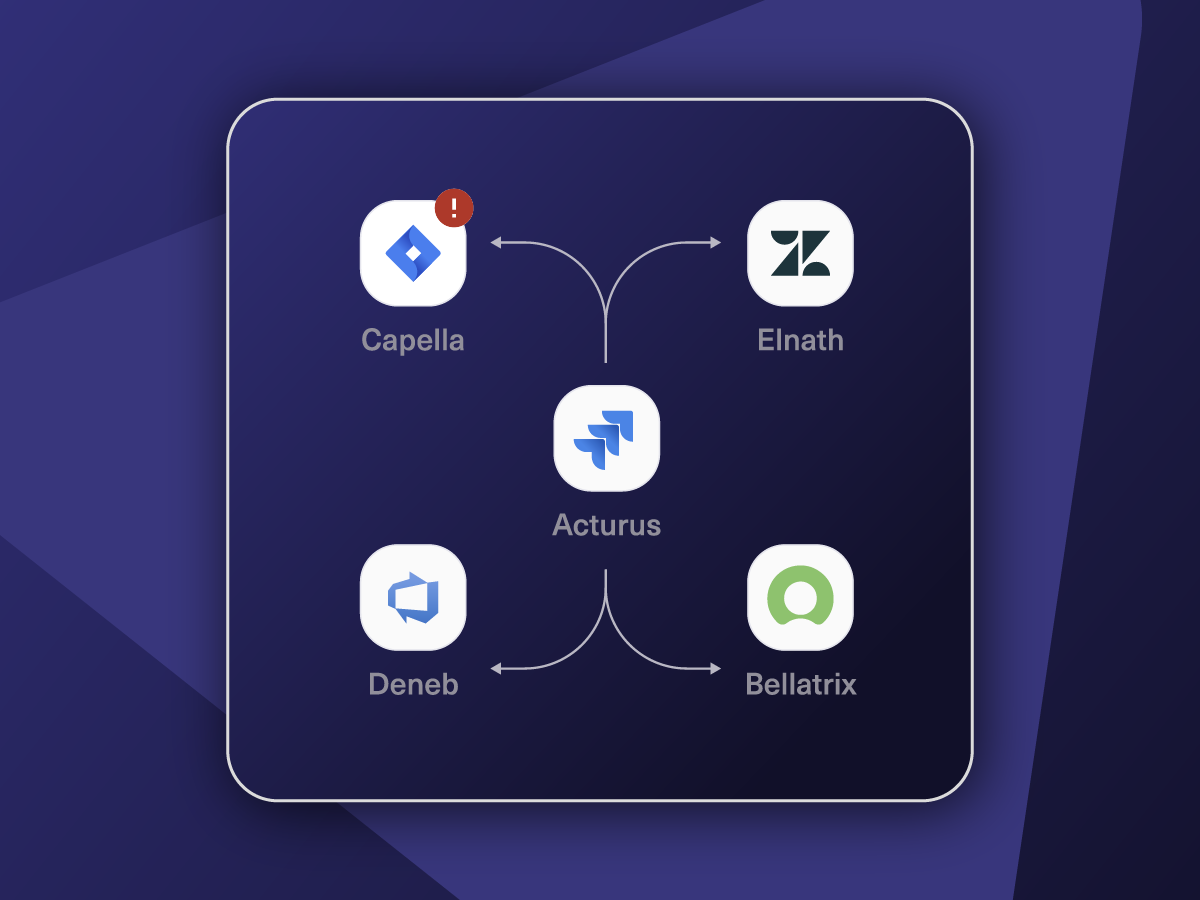
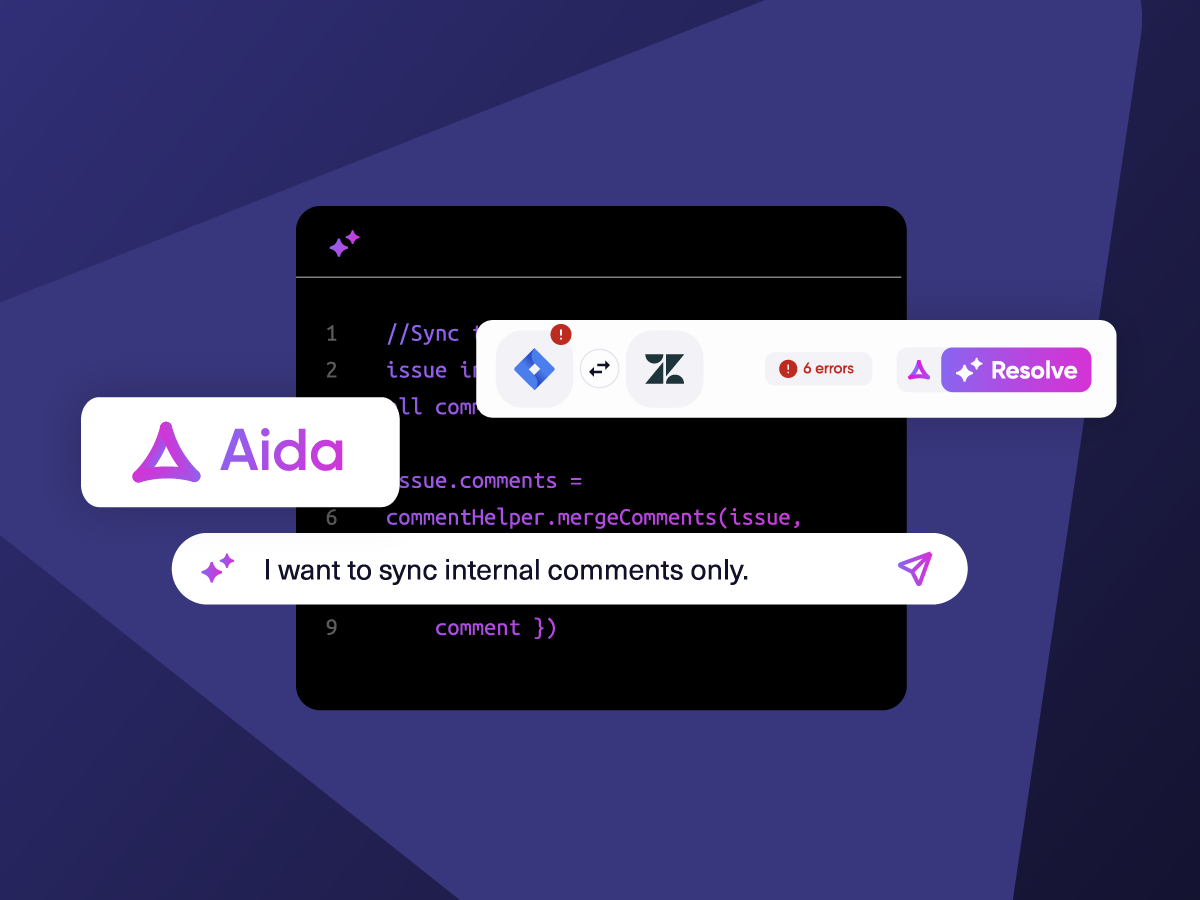
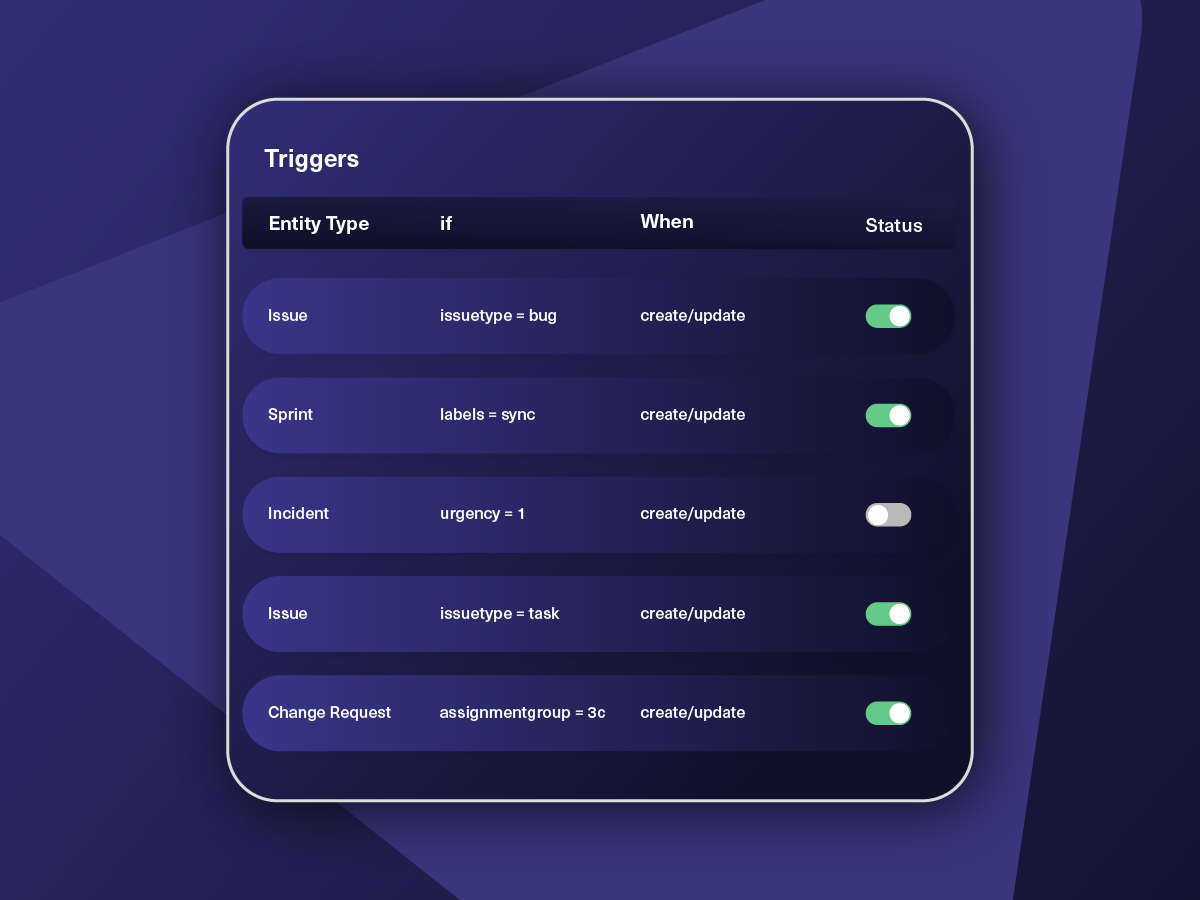
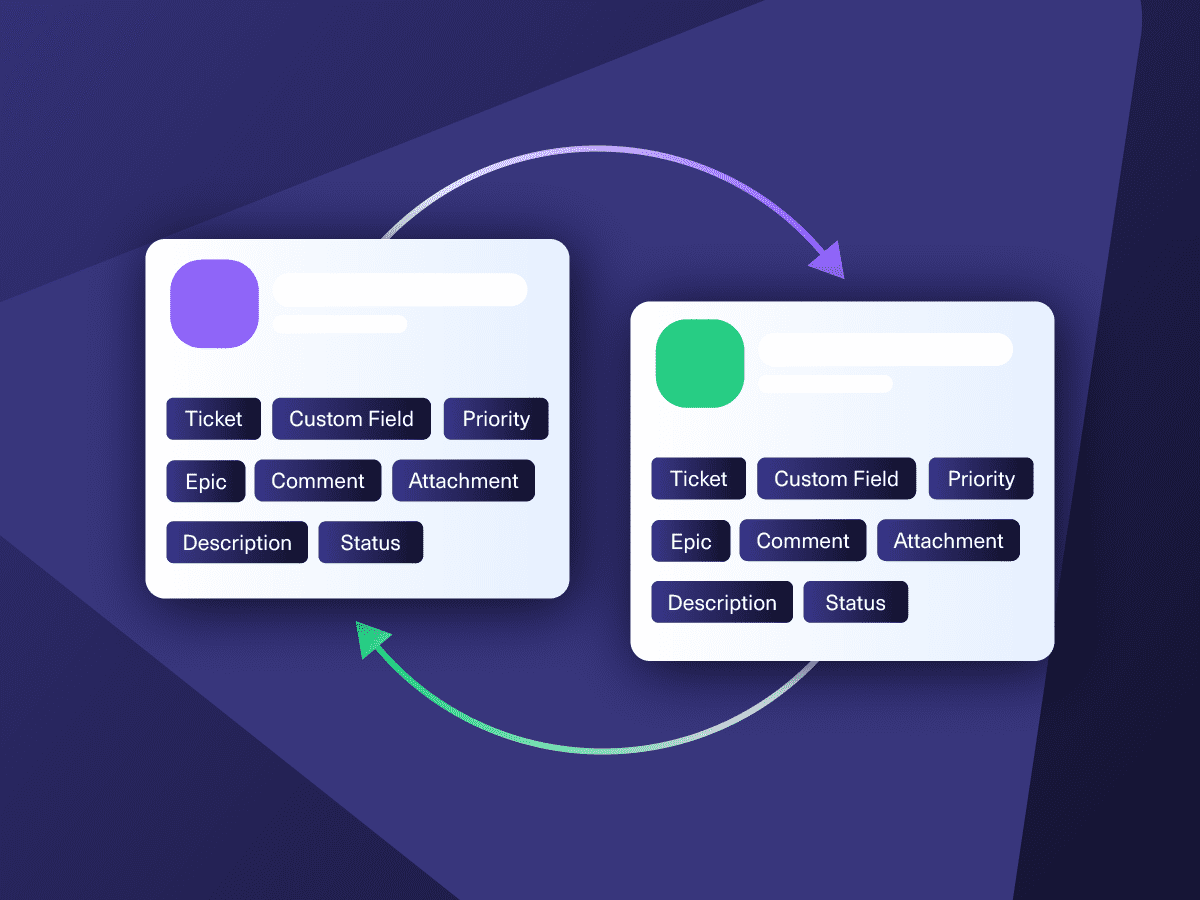
3.5/4

4.7/5
WHAT JIRA ADMINS SAY
"Exalates stands out the most due the fact that it is fully customizable. No use case is unsolvable. With other solutions, you're restricted to what they have configured for you."
"We have teams that need to work together, but in different systems. So instead or changing the way they work or making manual changes, we just sync with Exalate. They now stay in the tool they want, following company standards"

jorden van bogaert
atlassian service delivery manager

"Cut Service Desk costs by ~95%"
Senior PM

"Fully customizable — no use case is unsolvable."
Atlassian Solutions Expert

"We have 500+ tickets synced monthly"
Engineering Lead
Sync Simple or Go Advanced
Start with simple Jira to Jira integrations or customize the sync to handle any use case.
Sync Sprints and Epics
Bi-directionally sync Sprints and Epics between Jira instances. Keep sprint details, epic progress, and related issues aligned across teams, maintaining consistency and visibility in cross-instance projects.
In practice:

...Or simply write a few lines of code
Epic.receive()
//sync sprints
def boardIds = [“50”, “80”, “130”, “144”] //Boards which sprints will get synced
if(entityType == “sprint” && boardIds.find{it == sprint.originBoardId}){
replica.name = sprint.name
replica.goal = sprint.goal
replica.state = sprint.state
replica.startDate = sprint.startDate
replica.endDate = sprint.endDate
replica.originBoardId = sprint.originBoardId
}
if(entityType == “issue”){
//Executed when syncing an issue to a remote side
replica.summary = issue.summary
replica.description = issue.description
replica.project = issue.project
replica.type = issue.type
//sprint….
replica.customFields.Sprint = issue.customFields.Sprint
}
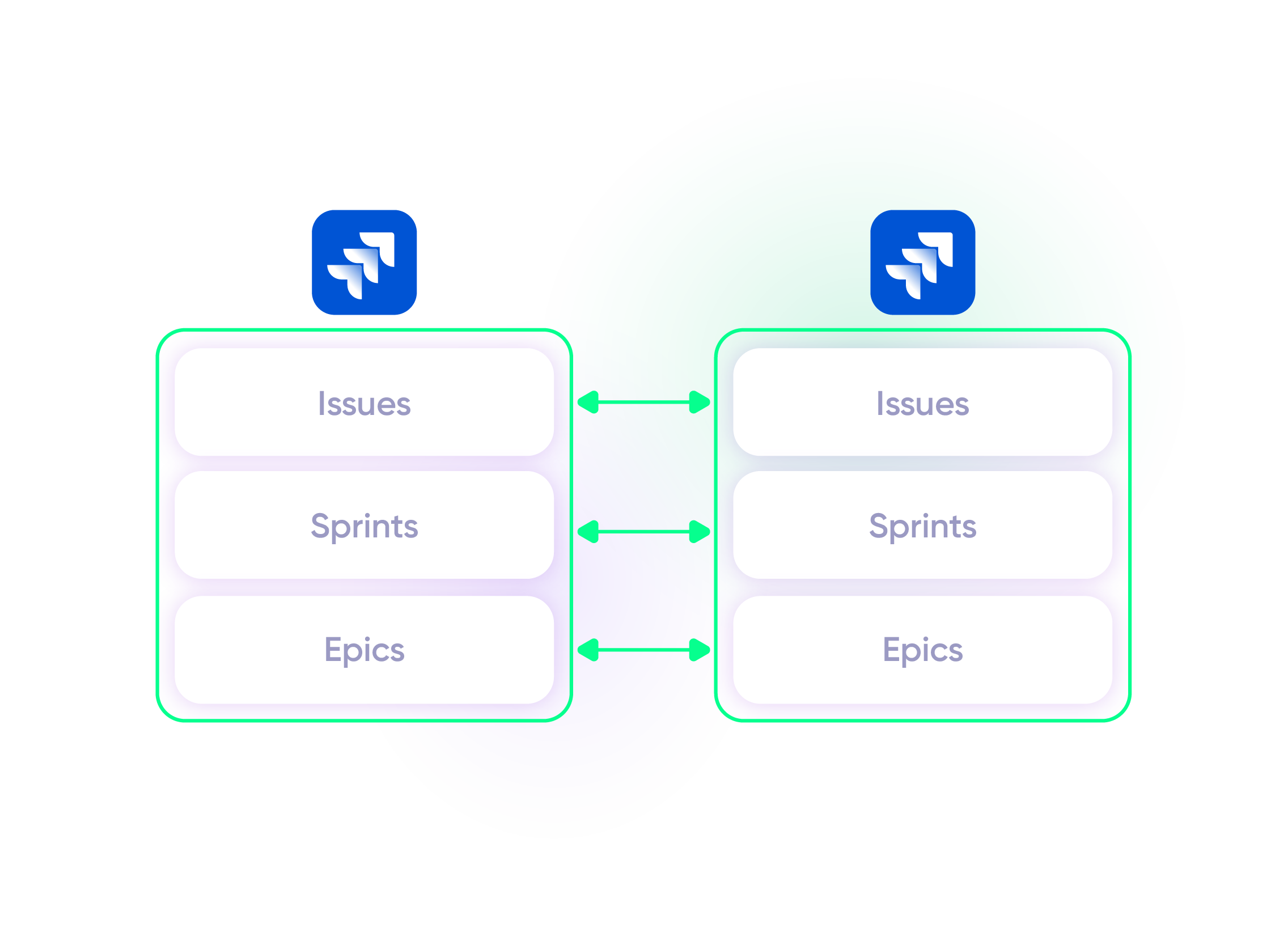
Sync Multiple Projects with Multiple Issue Types
Sync certain issue types into specific projects depending on the conditions you set.
In practice:

...Or simply write a few lines of code
if(replica.type.name == “Bug”) {
2 issue.projectKey = “TESTERS”
3 issue.typeName = “Test”
4 }
5 else{
6 issue.projectKey = “DEVELOPERS”
7 issue.typeName = “Task”
8 }
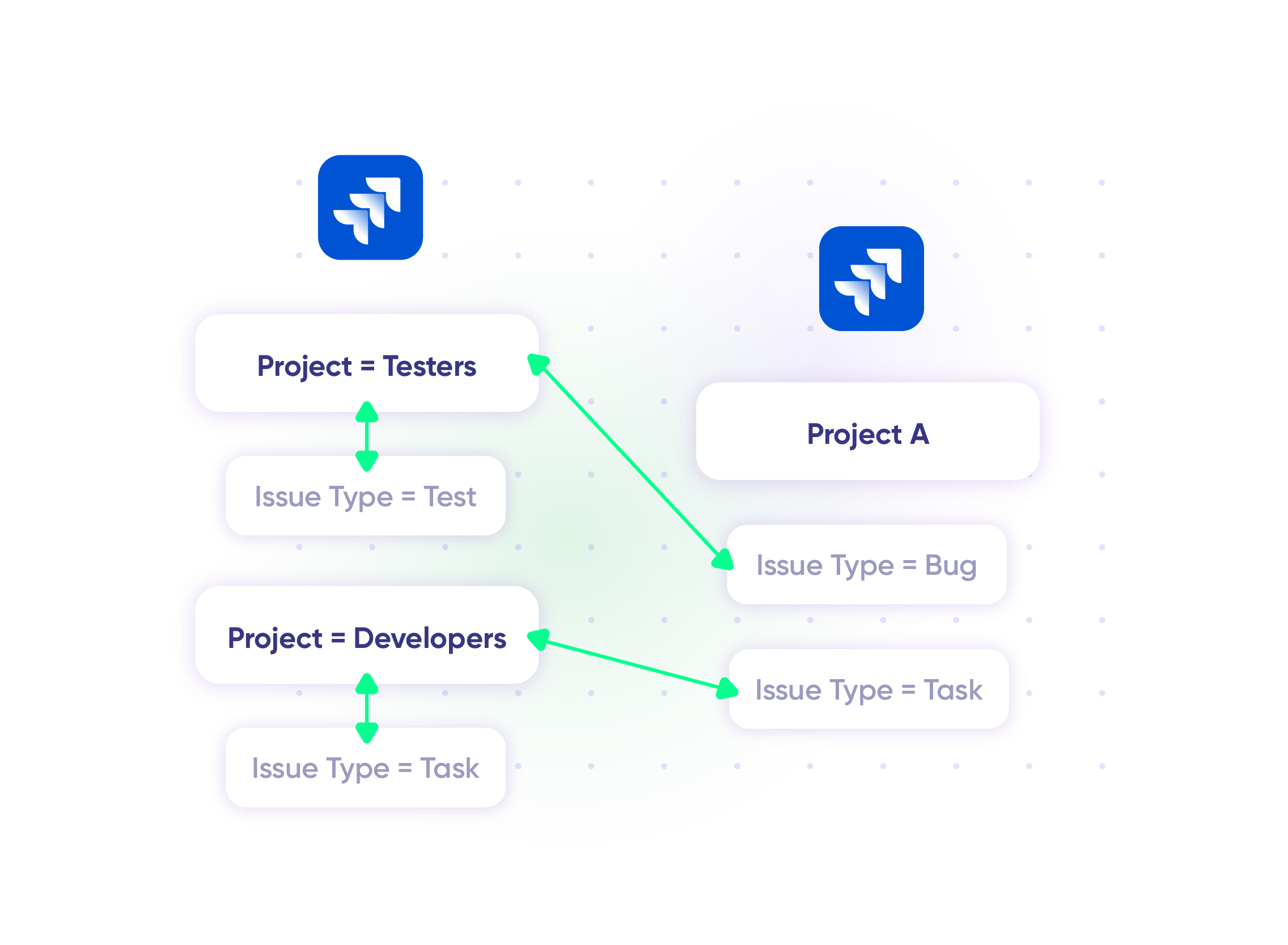
Connect Jira Service Management with Jira Software
Sync only public comments between Jira Service Management and Jira. Tag the right person by passing user mentions in the comments.
In practice:

...Or simply write a few lines of code
issue.comments = commentHelper.mergeComments(issue, replica, {it.internal = true})
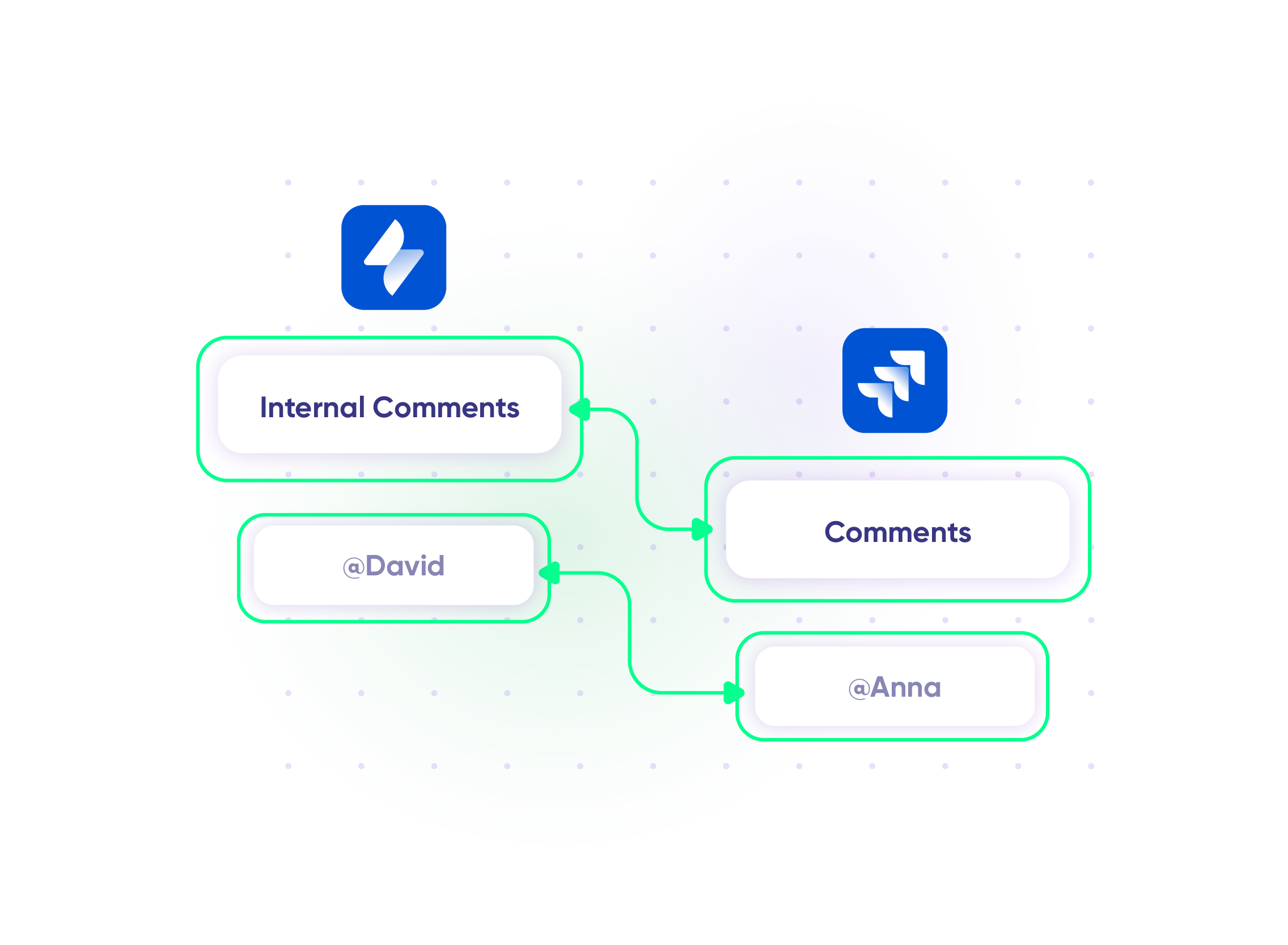
Automate Outsourced Dev Workflows
Enable controlled ticket sharing between an internal Jira and an external development firm’s Jira ensures full ownership of project records. Sync statuses for real-time visibility
In practice:

...Or simply write a few lines of code
def statusMap = [
“remote status name”: “local status name”
]Go to Entity Sync Status, put in the entity key, and it will show you where to find the remote replica
by clicking on Show remote replica.
def statusMap = [
“New” : “Open”,
“Done” : “Resolved
]
def remoteStatusName = replica.status.name
issue.setStatus(statusMap[remoteStatusName] ?: remoteStatusName)
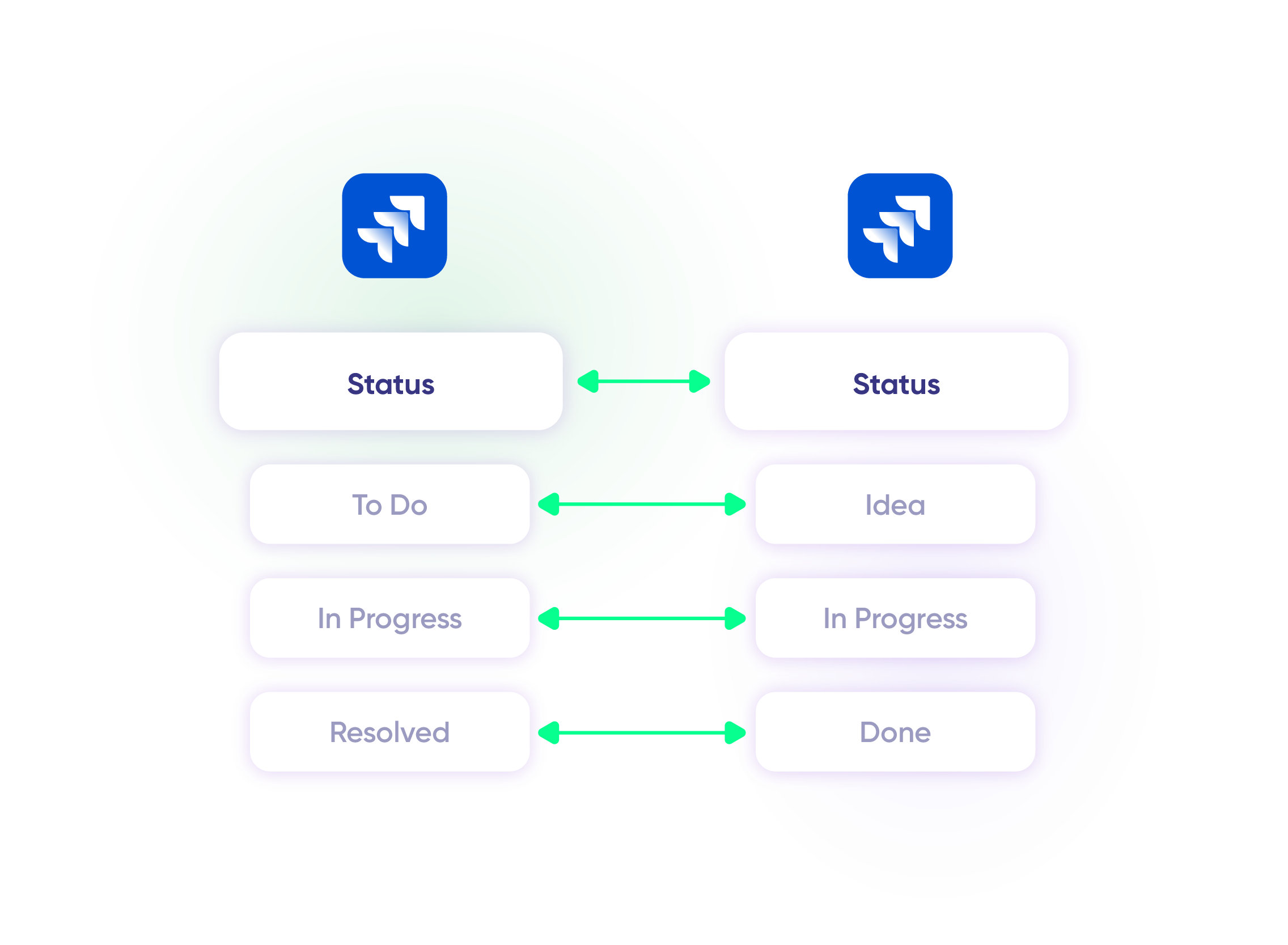
Sync Third-party Plugin Fields in Jira
Sync third-party app data like tempo worklogs, insight fields, etc.
Never lose sight of information.
In practice:

...Or simply write a few lines of code
replica.workLogs = issue.workLogs
TempoWorkLogSync.send(
“dJWtvBhJUkoHroDcEd8iYyYfnd0Bm”, // replace the “token” with the //previously generated access token
replica,
issue,
httpClient,
nodeHelper
)
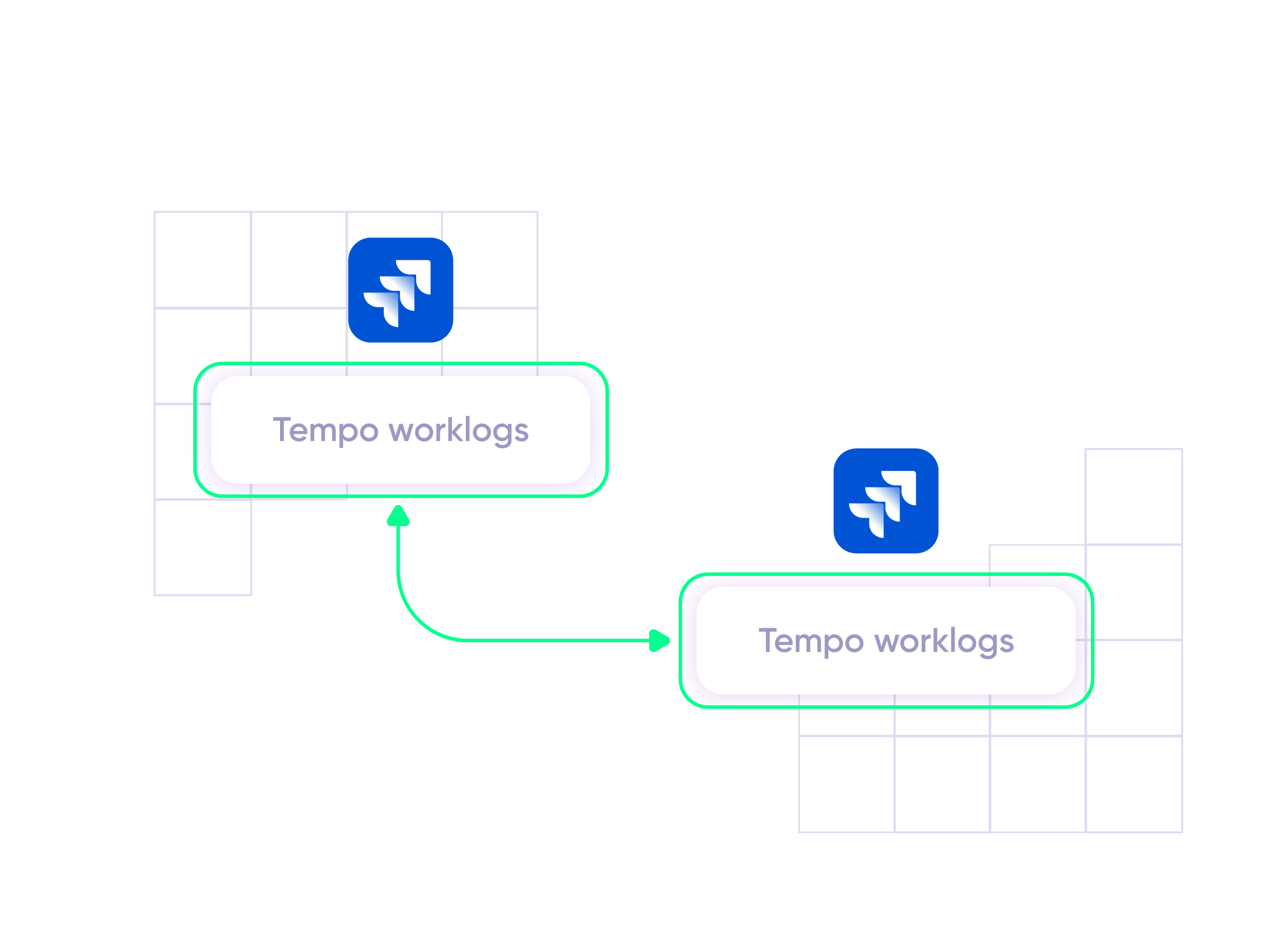
“
We can now handle around 500 customer incidents per week, thanks to Exalate, which is a very good result regarding the number of products we’re dealing with. It synchronizes 45x faster than our previous solution.
Christof Cuyper |

“
The team was very hands-on and very responsive. If we encountered an issue, they were able to resolve it quite fast.
Maarten Cautreels |

Always Ready to Help
Get the best assistance from technical support managers and engineers. Go at your own pace or lay back while we do most of the work for you.
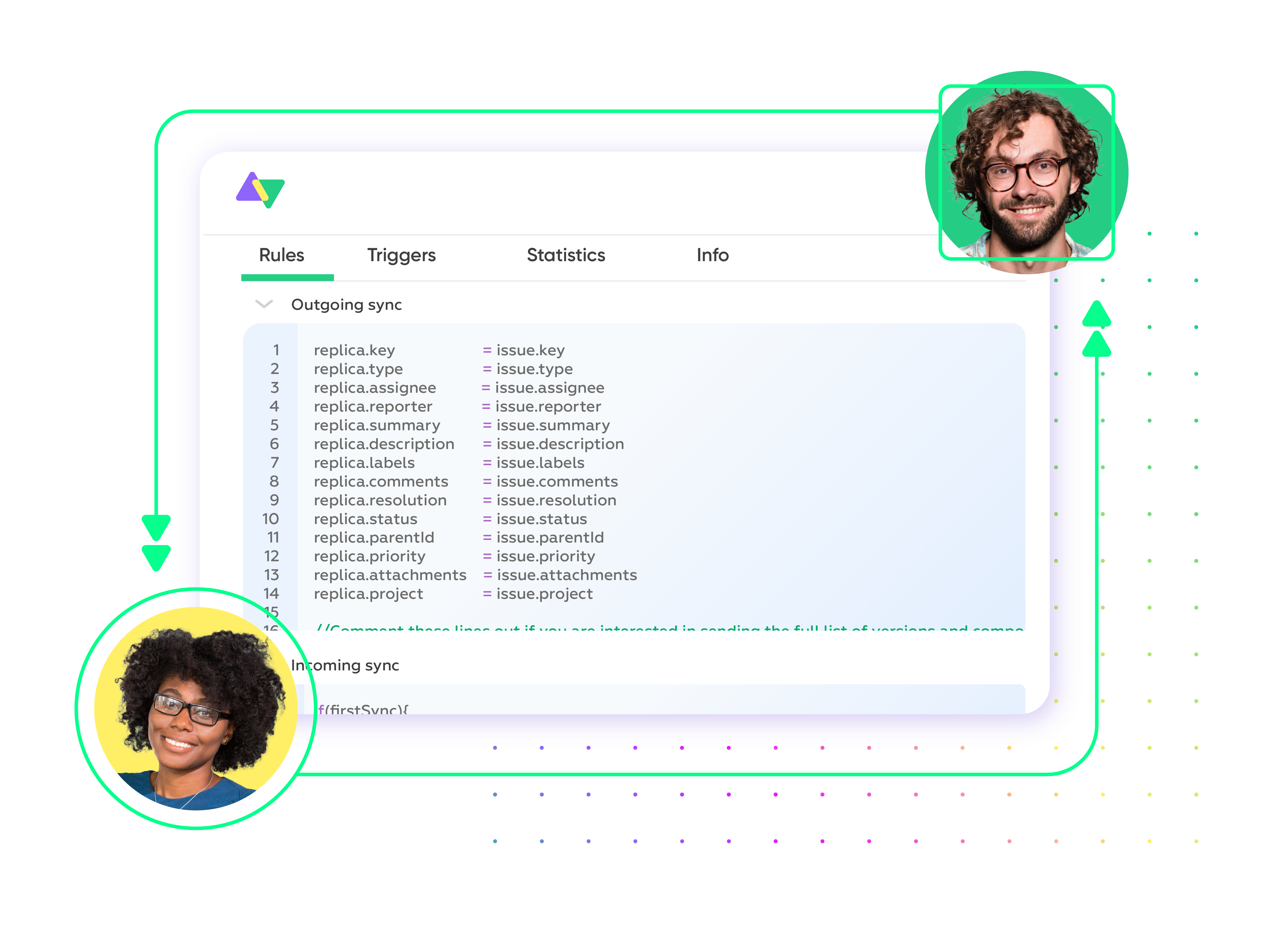
FAQ
Answers to the most frequent questions.
Didn't find what you were looking for? Ask Aida
Exalate is a bidirectional integration solution that connects multiple Jira instances for real-time data synchronization. It lets teams sync issues, sprints, custom fields, and comments between Jira Software and Jira Service Management. Unlike template-based tools, Exalate uses Groovy scripting for unlimited customization, so you can sync exactly what you need, how you need it.
You can sync any Jira field: standard or custom. This includes work types, summaries, descriptions, statuses, priorities, assignees, comments, attachments, labels, sprints, epics, and subtasks. You can also sync third-party plugin data like Tempo Worklogs and Insight fields. Advanced options include syncing user mentions in comments, filtering public vs. private comments, and mapping different field values between instances. Explore the full list of supported fields.
Exalate syncs changes in real time, typically within seconds of an update. When someone modifies a work item in one Jira instance, the change appears in the connected instance almost instantly. The exact speed depends on your network, data volume, and API rate limits, but most users experience near-instantaneous updates with no manual intervention required.
Yes, Exalate is designed for intra- and cross-company scenarios. Each organization maintains independent control over what data it sends and receives, so there’s no need to share admin credentials or grant access to your Jira instance. Exalate uses single-tenant architecture (your data is isolated from other customers), JWT-based authentication, and end-to-end encryption. Advanced endpoint detection and response (EDR) helps identify suspicious activity.
Learn more about Exalate’s security posture at its Trust Center.
Yes, Exalate supports both one-way and two-way synchronization. For one-way sync, you configure outgoing rules on the source instance without setting incoming rules on the destination, or vice versa. This is useful when one team needs visibility into another’s work without editing rights, like marketing tracking development features, or QA reporting bugs to developers.
Exalate uses outcome-based pricing where you pay based on active items currently in sync, not user counts or total historical volume. Paid plans (Scale, Pro, Enterprise) increase capacity and add features like bulk operations, priority support, and sandbox environments. Each integration between two unique systems requires its own plan. View pricing details or estimate the cost of the plan here.
Yes, Exalate supports multi-node networks where multiple Jira instances sync with each other. You can create hub-and-spoke configurations (one central instance connected to several others) or mesh networks where instances connect as needed. This is common for enterprises with department-specific instances or MSPs managing multiple client environments.
Yes, Exalate integrates all Jira products: Jira Software, Jira Service Management (JSM), and Jira Work Management. You can sync JSM tickets to Jira Software issues, converting customer support requests into development tasks automatically. Common scenarios include routing service desk escalations to engineering teams or syncing incident details for post-mortem analysis.
Exalate offers Standard and Priority Support options. Standard Support covers troubleshooting, community help and upgrades via documentation and ticket-based assistance. Priority Support adds a dedicated engineer, faster response times, and help with complex configurations. For managed service providers, Exalate’s MSP program provides end-to-end integration management.
Yes, Exalate supports bidirectional sprint and epic synchronization. Sprint details (name, goal, start/end dates, state) sync between instances, keeping agile teams aligned across separate Jira environments. Epics sync with their child issues, maintaining your hierarchy. You can configure which boards’ sprints to sync using Groovy scripts for precise control.
Jira Automation works well for simple, one-directional actions but has limitations for complex bidirectional sync. Exalate handles continuous two-way synchronization with field mapping, conflict resolution, and custom logic that Automation can’t match.
Exalate enables controlled ticket sharing between your internal Jira and a partner’s Jira without exposing sensitive project data. You define which issues sync (using JQL triggers), which fields to share, and how statuses map between systems. Each organization maintains their own workflows and permissions suc that changes you make don’t affect your partner’s configuration, and they never need credentials to your instance.
Yes, Exalate supports bulk operations for syncing historical data. Bulk Connect lets you sync multiple existing issues at once based on JQL criteria. Bulk Exalate applies the same trigger rules to many issues simultaneously. This is useful when setting up a new integration and need to backfill existing issues rather than starting with only new items.
Exalate provides a unified console where you can view and manage all your connections and nodes from one interface. You see a network visualization of how your instances are interconnected, monitor sync queues in real time, and access script rules for both sides of each connection on a single screen. This eliminates switching between multiple Jira admin consoles.
Start registering your account on the Exalate app. Connect your Jira instaces using OAuth. Create a new connection and set triggers. Most basic connections using default sync scripts take under 30 minutes to configure.
